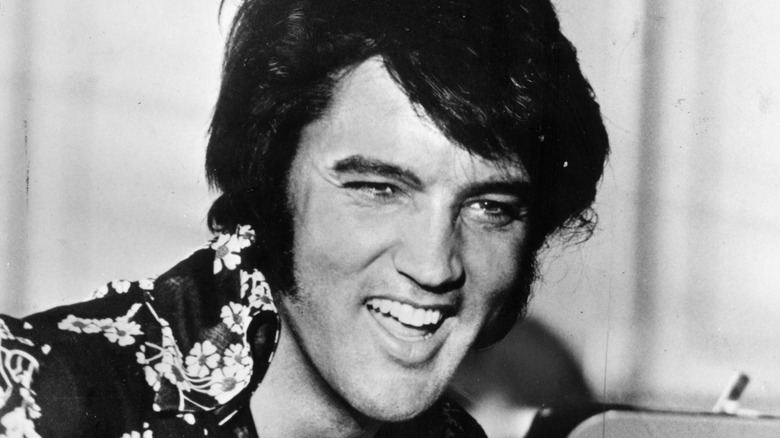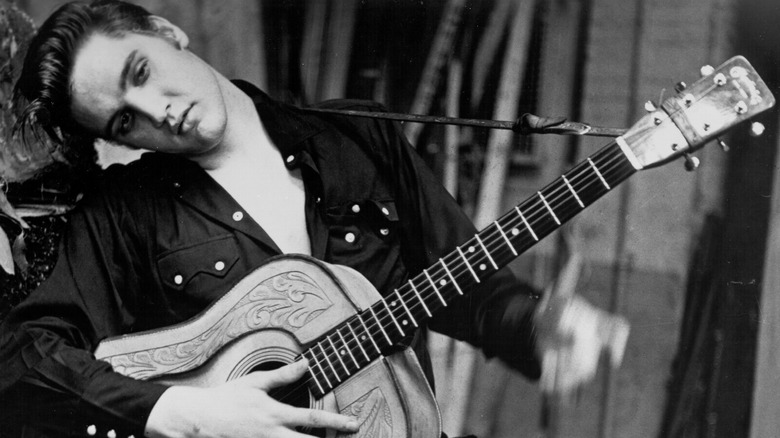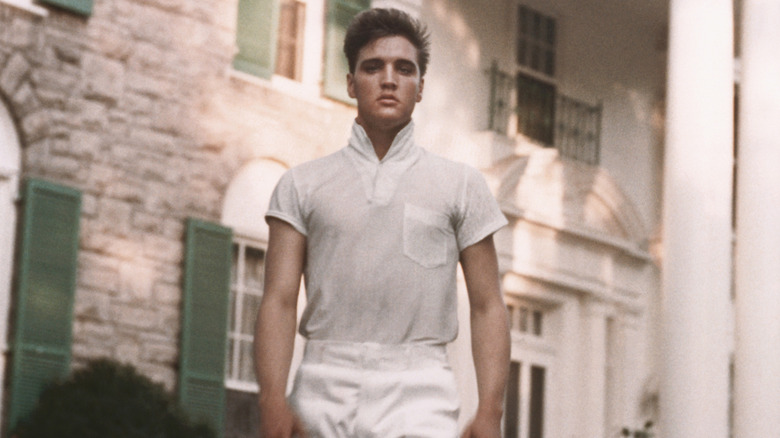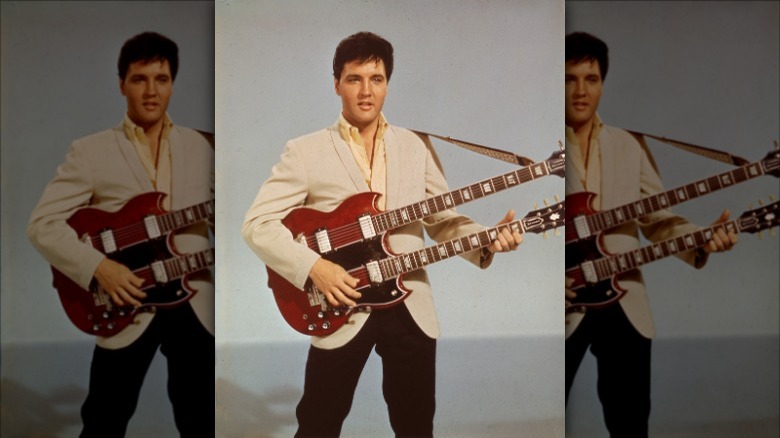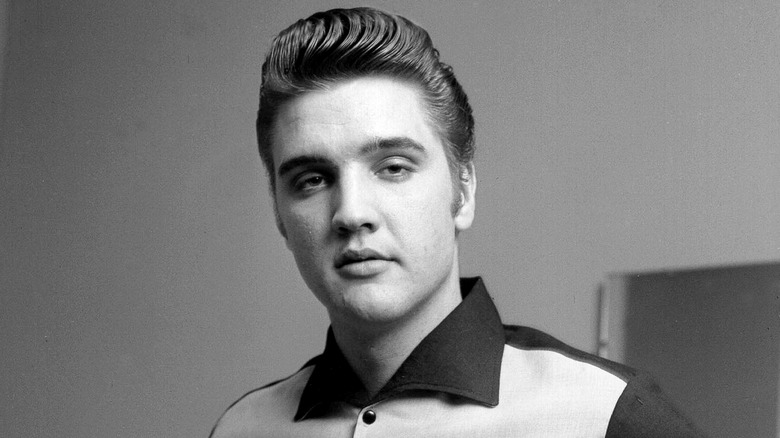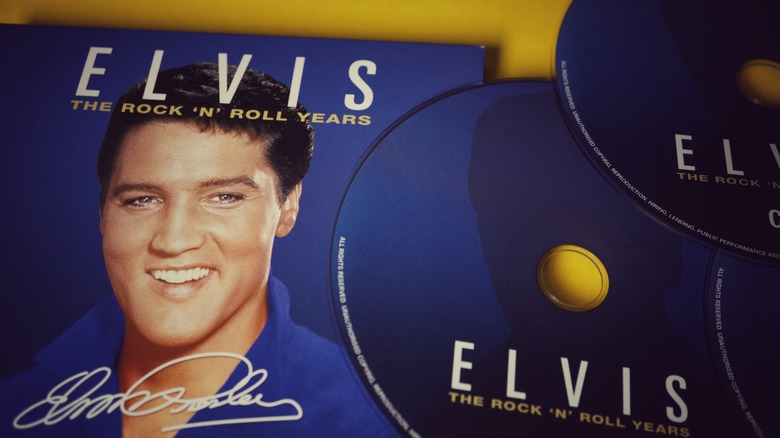How Elvis Presley's Neighbors May Have Played An Unexpected Hand In The Legend's Career
Elvis Presley. The very name alone conjures up images of an almost ethereal superstar, a relentlessly energetic and talented performer. Later in his career, Elvis (so famous that a surname is unnecessary) strutted about the stage in those legendary jumpsuits, taking on songs from his fellow musical icons and making them his own, too.
In 1973, for instance, he belted out "My Way" during his "Aloha from Hawaii" performance (per Elvis Presley on YouTube), and though the song is most commonly associated with Ol' Blue Eyes himself, Frank Sinatra, Elvis most certainly did it his way. He did it to incredible fanfare and success, too: according to NPR, the legendary concert was watched by over one billion people around the world.
Presley's showmanship, catalog of classic songs, and unique, sometimes controversial dance moves ensured that, whether avid fan or detractor, nobody could deny what an impact he had on the landscape of music. His career, however, did not come easily to him.
The King's first royal recording
The King's earliest forays into the world of music weren't exactly groundbreaking from the off. As CBS News reports, it's "That's All Right Mama" that is often regarded as the first Elvis Presley song, the one that garnered him countrywide attention which would soon blossom into worldwide acclaim. This did not happen overnight, however.
The outlet goes on to state that Presley's first recording was about as inauspicious as it gets. He paid the princely sum of $4 for a fleeting session of one-off recording time at Sun Studio. Quite apart from a chance at his big break, or even knowing whether he was likely to get one, CBS shares the famous piece of Elvis folklore: the recording was perhaps intended as just a humble birthday gift for his mother.
Emerging from the studio having recorded his take on "My Happiness," the 18-year-old could never have dreamed that he had just recorded what would become, in the words of Graceland archivist Angie Marchese (per CBS News), "the holy grail of rock and roll."
In January 2015, at an auction to mark what would have been the King's 80th birthday (according to The Guardian), that one-of-a-kind record was sold. The price? $300,000. Sam Phillips of Sun Records would go on to have a monumental effect on Elvis' career. The studio was, perhaps, the reason he went on to have one. Presley's neighbors, however, could have been just as important.
The birth of a legend
According to Sun Records, Elvis Presley met Sam Phillips in 1954, back at his studio. Elvis performed a few songs for him, and was introduced to two other local talents, Bill Black and Scotty Moore, for his troubles. Though he continued to work at the Crown Electric Company at the time, the future King now had the ensemble he needed. The budding young star had the drive and the talent. As musicians today continue to find, sadly, it's difficult to make that leap to success without connections, without a way to amplify that voice (however great it may be).
This journey is different for every star. In a 2012 interview, via Rolling Stone, Simon Cowell claimed responsibility for the creation of superstar boy band One Direction. Regarding the qualities he divined in the quintessential quintet, he explained, "A combination of everything: some particular people who I didn't want to lose — Harry being one of them ... there was actually a gap in the market for a group like them at that particular moment."
Cowell's "gut instinct" ultimately finalized the decision, he said, and led to One Direction's own great success. Like Elvis, they had somebody who believed in them and who had the industry connections to make it happen, or at least begin to make it happen. What inspired Presley to want to be a singer in the first place, though? Several different factors, it seems, including perhaps his neighbors' taste in music.
Elvis Presley: the gospel truth
The smallest things, the most seemingly innocuous coincidences, can shape our lives in incredible ways. According to Graceland, 11-year-old Elvis Presley was given a guitar. It was his first. Like a lot of children, he could very well have left it to gather dust in short order, moving on to the next passing interest. The world would have been deprived of a remarkable talent if he'd done so, but fortunately, music would define Elvis Presley for the rest of his life.
As Biography reports, Elvis was born in January 1935. Some of the boy's earliest exposure to music came at the Assembly of God church, which the family attended. While there, the sheer emotion, power, and exuberance of gospel music seemed to shape his tastes, and through the ups and downs of his remarkable career, it continued to. Per Grammy.com, the King's first Grammy award was in 1967 for Best Sacred Performance, which he won with his formidable rendition of the gospel masterpiece "How Great Thou Art."
Per AllMusic, this was the title track of Presley's sophomore gospel album, which indicates the deep connection he felt to the material. As is surely common with musicians, early exposure to certain artists and genres had a profound effect on him. It doesn't even matter if said music happened to reach his impressionable ears from the neighbors' house.
The influence of the Presleys' neighbors
Elvis Presley's humble origins are often remarked upon, and the family had a bit of a saving grace in that regard: their neighbors. According to Forward, the Presleys shared their Alabama Avenue address with a married couple: Rabbi Alfred and Jeannette Fruchter. The Fruchters lived above the Presleys before leaving Memphis in 1955, and their shared home has since become an apartment complex. Nonetheless, these unsung heroes of Elvis' story helped to shape his career in some surprising ways.
The outlet goes on to state that the Fruchters would lend the Presleys much-needed money, surely helping them to do no more or less than keep their very home. On top of that, they indirectly provided the budding superstar with a source of music. Speaking to The Baltimore Sun in 1997 (per Forward), Mrs. Fruchter herself is quoted as saying, "My husband listened to his records every Sunday, with the windows open, because it was so hot in Memphis ... " The music, she went on, reached quite a distance, and it may well have reached a certain young man just downstairs who nursed dreams of becoming a superstar singer.
Where would Elvis have been without the Fruchters?
Per Forward, Rabbi Alfred and Jeannette Fruchter's son Harold would later say that his father doubted his record collection had any effect on the music Elvis Presley produced. In the rabbi's view, according to his son, the King's songs weren't "anything like great cantorial music."
This certainly isn't to say, though, that the fantastic and versatile musicians of the day did not influence Elvis. One incredible talent who inspired him was Sister Rosetta Tharpe. Per Rolling Stone, Gordon Stoker of the Jordanaires said, "That's what really attracted Elvis: her pickin'. He liked her singing, but he liked that pickin' first — because it was so different."
The talents of the guitar-pickin,' gospel-singing Tharpe had rather a well-known influence on the work Presley would go on to produce. He would later prove to be an inspiration for a diverse range of talents, and perhaps he too was inspired by an equally diverse range. The cantors on Rabbi Fruchter's record collection may well have been among them, even if subconsciously on the King's part. Even if they weren't, the kindly couple's financial aid proved crucial in the Presleys' fortunes, and he may never have gotten the opportunity to make it in music without them.
